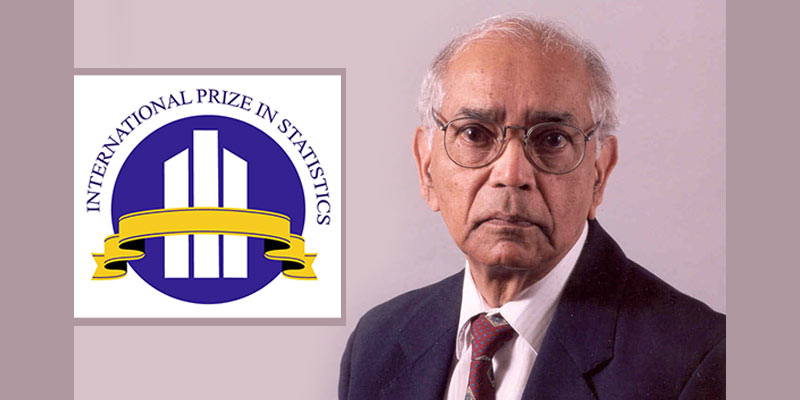- India
- Apr 11
C.R. Rao awarded International Prize in Statistics
Calyampudi Radhakrishna Rao, a prominent Indian-American mathematician and statistician, will receive the 2023 International Prize in Statistics.
Rao, 102, will receive the prize, which comes with an $80,000 award, this July at the biennial International Statistical Institute World Statistics Congress in Ottawa, Canada.
The International Prize in Statistics
• The International Prize in Statistics is awarded every two years by a collaboration among five leading international statistics organisations.
• The prize recognises a major achievement by an individual or team in the statistics field, particularly an achievement of powerful and original ideas that have led to practical applications and breakthroughs in other disciplines.
• The prize is modelled after the Nobel Prize, Abel Prize, Fields Medal and Turing Award.
• The first International Prize in Statistics was awarded in 2017 to David R. Cox for the development of the Cox proportional hazards model, which allows researchers to investigate patient survival rates in complex studies.
• Bradley Efron received the award in 2019 for a statistical method known as the bootstrap, a clever computational method for assessing uncertainty in applied statistics.
• Nan Laird received the award in 2021 for the development of powerful methods that have made possible the analysis of complex longitudinal studies.
Key results published in 1945
• In his 1945 paper published in the Bulletin of the Calcutta Mathematical Society, Rao demonstrated three fundamental results that paved the way for the modern field of statistics and provided statistical tools heavily used in science today.
• The first, now known as the Cramer-Rao lower bound, provides a means for knowing when a method for estimating a quantity is as good as any method can be, it said.
• The second result, named the Rao-Blackwell Theorem (because it was discovered independently by eminent statistician David Blackwell), provides a means for transforming an estimate into a better — in fact, an optimal — estimate. Together, these results form a foundation on which much of statistics is built.
• And the third result provided insights that pioneered a new interdisciplinary field that has flourished as information geometry.
• Combined, these results help scientists more efficiently extract information from data.
• Information geometry has recently been used to aid the understanding and optimisation of Higgs boson measurements at the Large Hadron Collider, the world's largest and most powerful particle accelerator.
• It has also found applications in recent research on radars and antennas and contributed significantly to advancements in artificial intelligence, data science, signal processing, shape classification, and image segregation.
• The Rao-Blackwell process has been applied to stereology, particle filtering, and computational econometrics, among others, while the Cramer-Rao lower bound is of great importance in such diverse fields as signal processing, spectroscopy, radar systems, multiple image radiography, risk analysis, and quantum physics.
Rao was awarded Padma Vibhushan in 2001
• Rao was born to a Telugu family in Hadagali, Karnataka. His schooling was completed in Gudur, Nuzvid, Nandigama, and Visakhapatnam, all in Andhra Pradesh.
• He completed MSc in mathematics from Andhra University and MA in statistics from Calcutta University in 1943.
• He obtained a PhD degree at King’s College at Cambridge University.
• Rao first worked at the Indian Statistical Institute and the Anthropological Museum in Cambridge.
• Later he held several important positions, as the director of the Indian Statistical Institute, professor at the University of Pittsburgh and Eberly Professor and Chair of Statistics and director of the Center for Multivariate Analysis at Pennsylvania State University.
• He is currently a professor emeritus at Pennsylvania State University and Research Professor at the University at Buffalo.
• Rao has received many honours. He was awarded the Padma Bhushan in 1968 and Padma Vibhushan in 2001.
Manorama Yearbook app is now available on Google Play Store and iOS App Store

